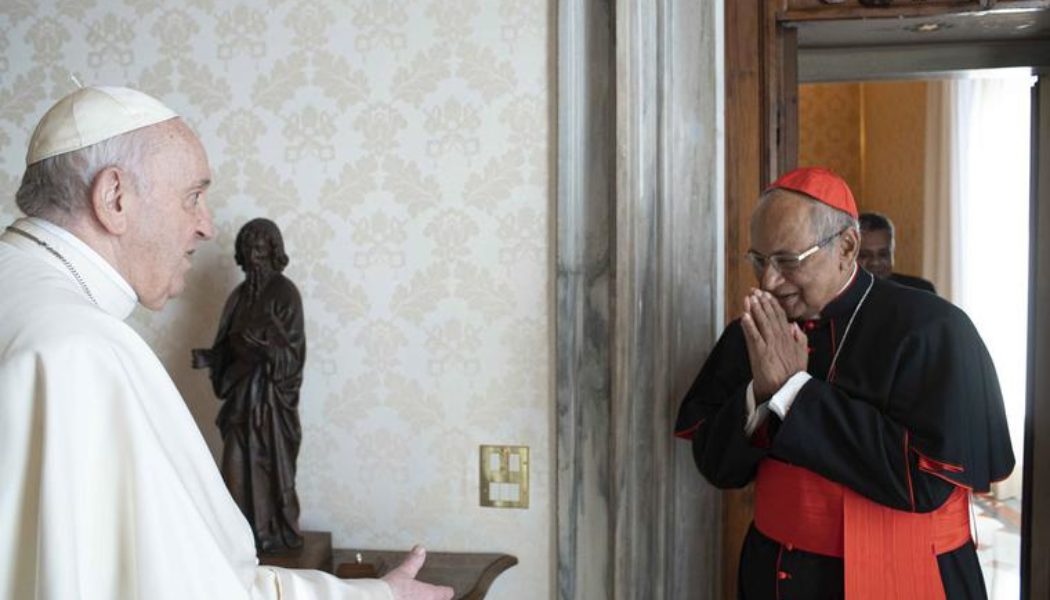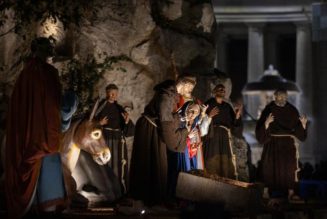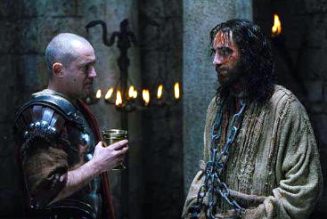
The Sri Lankan cardinal discussed a wide variety of topics with the Register April 29.
VATICAN CITY — In an extensive video interview with the Register, Cardinal Malcolm Ranjith welcomed Pope Francis’ reform of the Roman Curia, said the German Church’s Synodal Path is unacceptable, and sounded the alarm for his native Sri Lanka currently facing a devastating economic crisis and allegations of criminality at the highest levels of politics.
Speaking in Rome on April 29, the cardinal archbishop of Colombo called the changes the Pope is making through his new apostolic constitution for the Roman Curia, Praedicate Evangelium (Preach the Gospel), “very good” but, he added, real reform won’t be achieved “unless that attitude inside the heart of each person changes.”
[embedded content]
In the reforms, which come into effect on the Solemnity of Pentecost June 5, the Pope is combining the Congregation for the Evangelization of Peoples, founded in 1622, with the Pontifical Council for the New Evangelization to form a new super-dicastery for evangelization, which will become the second most important Vatican department, above the Congregation for the Doctrine of the Faith but below the Vatican Secretariat of State.
Cardinal Ranjith, who served as an official at the Congregation for the Evangelization of Peoples from 2001 to 2004, told the Register that placing evangelization at the center was “a very good move” and that such a reform is needed to accommodate the “needs of the times,” ones which are “terrible with regard to the faith.”
On the controversial Synodal Path of the Church in Germany, which could precipitate a schism as it pushes for acceptance of homosexual acts, women priests and an end to clerical celibacy, Cardinal Ranjith said he “cannot accept” what is happening there as the Church is a “universal fraternity” and the German Church cannot “answer for all our problems in the whole world.”
He said the controversies over the Synodal Path “must be a burden to the Holy Father,” but he added that, as shepherds, it is the task of bishops to not only be open and listen, but also to “go in front” and face the challenges, “even if we are killed in the process.”
[embedded content]
“It’s difficult, but we have to pray, because we are not doing something on our own, there’s the bigger player, the Lord himself,” he said.
Last month, more than 70 bishops from around the world signed a “fraternal open letter” to Germany’s bishops warning that the “Synodal Path” appeared to be focused more on man’s will than God’s, and could lead to schism. Their letter followed similar corrections earlier this year from Nordic bishops and the president of the Polish bishops’ conference.
Sri Lanka Situation
Cardinal Ranjith, who was visiting Rome with a group of Sri Lankan faithful to meet Pope Francis on the third anniversary of the Easter Sunday bombings in the country, restated his criticisms of the government which, he firmly believes, is covering up its responsibility for the worst terrorist attack in Sri Lanka’s history.
The attack on April 21, 2019, in which Islamists bombed three churches and as many hotels, killed nearly 270 people, including 45 foreign nationals from 14 countries.
[embedded content]
The cardinal cited links between ruling President Gotabaya Rajapaksa and the group behind the suicide bombers, and claimed the atrocities were orchestrated to provoke violence between the Sinhalese people and Muslims, and generate Islamophobia ahead of a general election six months later that brought Rajapaksa to power. The cardinal has called for a U.N.-led mechanism to probe the 2019 atrocities.
Pope Francis expressed his closeness with the families of the victims of the bombings, and appealed to the country’s authorities to uncover the truth behind the attacks, saying it will usher in peace.
“We are very happy the Holy Father said that,” Cardinal Ranjith told the Register, adding that he had brought 45 pilgrims to meet the Pope, some of whom had “lost all their family and they are all alone at home and they have no hope.”
Economic Crisis
The cardinal also addressed an increasingly dire economic situation in Sri Lanka which he explained has been caused by a collapse in the tourist industry because of COVID-19 restrictions, as well as corruption and “huge debt that successive governments had collected or inherited.” Rising fuel costs due to the war in Ukraine have also exacerbated the problems, as well as the ruling government’s “irrational” decision to stop fertilizer imports into the country, completely destroying its agrarian economy in the process.
[embedded content]
“The government has completely mismanaged the entire economy and therefore we have come to a situation where there’s nothing,” the cardinal said. “The most tearful and most fearful thing is that the children in hospitals have no medicine because you have to buy medicine from overseas, from the chemical companies that produce these medicines, and they don’t have any money. So the children are dying in hospitals and also in the cancer wards, the children have no medicine and they’re suffering a lot.”
“Our situation is terrible and the whole country has risen up,” Cardinal Ranjith said, adding that Sri Lanka was heading towards a revolution unless the government makes “radical changes.”
He appealed to the international community not to support the ruling government but rather “pressurize the government to leave, in a dignified way, and then allow a neutral group to take over.”
Join Our Telegram Group : Salvation & Prosperity








